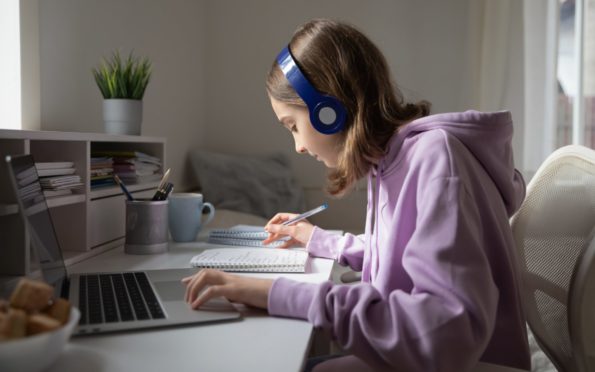Home learning will be over today for most children, with all primary school pupils back in class from Monday.
It will continue until the Easter holidays for secondary school pupils, most of whom will get only a day or two in school a week until the end of this month.
With children having had between six and 12 weeks of remote learning, depending on their age, we asked parents and carers about the provision and how we coped.
Today, we set out the results of our home school survey, in which we asked about everything from digital access to assessment for qualifications.
The results
First, we asked whether parents agreed with the Scottish Government’s decision to close school buildings to all but key worker children and vulnerable children from the start of this term.
Most thought it was the right call, with 58.5% agreeing or strongly agreeing and 37% disagreeing or strongly disagreeing.
One Dundee parent told us: “I have an underlying health condition, my children were very worried about bringing home the virus to me. Remote learning is not ideal but we all feel safer.”
But another from Angus, who strongly disagreed, said: “Children’s education and futures are being sacrificed.”
Worryingly, almost one in 10 respondents – 9.4% – told us their broadband access was inadequate for online learning.
And despite councils in Angus, Dundee, Fife and Perth and Kinross distributing thousands of laptops, 3% of respondents said their child still did not have a device for learning.
Some 28% were sharing a device with a parent and 13% were sharing with a sibling, limiting the time they could learn online.
Balancing their children’s home learning with their own work or other responsibilities was a major challenge, with four out of five primary school parents saying they struggled.
A grandparent from Angus caring for their grandchild told us: “I am out of touch with the education system as it is now.
“It is stressful for us both and I feel I am letting him down with my limited technology skills far less some of the numeracy work. There are some days we achieve very little.”
While 45.3% were satisfied with quality of remote learning delivered to primary school children, a significant 42.2% were not.
Among secondary school parents more than half (51.7%) were not satisfied with the provision, compared to four in 10 (40%) who were.
It is stressful for us both and I feel I am letting him down with my limited technology skills far less some of the numeracy work. There are some days we achieve very little.”
An Angus grandparent
One Dundee parent told us: “Lessons are well explained to both children and parents. There is a good balance of digital learning and learning that can be uploaded and done away from the computer. Teachers are available and always there to help. Daily video class meetings and chats are fun and help to keep children connected.”
But another from the city complained of “past papers, past papers, past papers”. They said: “That’s all he gets, that’s not remote learning. It’s taken a dedicated, hardworking student and turned him into someone that wants to leave education at the end of term, simply because the remote learning has been so poor.”
Almost three-quarters (71.6%) of secondary parents and almost two-thirds (63.7%) of primary parents agreed provision had improved since the first lockdown last year but almost as many – 65% and 60% respectively – would like to have seen more live lessons.
More than half (53.3%) of secondary school parents said they struggled to motivate their child to participate in online lessons, although just over a third (36.7%) said this was not a problem.
Lack of contact with peers was a concern for most parents, 96.8% of primary parents worried and 83% of secondary parents.
More than three-quarters (76.2% of primary parents and 77.9% of secondary parents) were concerned about their child’s mental health.
A Perth and Kinross parent described their secondary school children as “fed-up, disengaged, missing friends” and regressing in confidence. They said: “Their worlds are getting smaller when they should be getting bigger.”
Around two-thirds (68.2% and 60.4% respectively) were also worried about their own stress levels as a result of remote learning.
Among those respondents whose children had exams cancelled, there was a lack of confidence in 60.7% in the alternative assessment model developed by the Scottish Qualifications Authority.
One respondent from Angus worries about the impact of a lack of face-to-face teaching, particularly for those less academically-able. They said: “I am sure many senior pupils will not do as well as they should due to the way they have had to learn.
“They just aren’t capable of distance learning at that age.”
We also asked secondary school parents whether they would like to see exams replaced by assessment in future, and almost half (43.9%) gave a resounding no. Around a fifth (21.1%) would like exams ditched but just over a third (35.1%) were undecided.
Two Dundee parents expressed opposing views on this.
One said: “Exams are simply a memory test and can go wrong, if a pupil suffers from nerves or is having a bad day. Assessments show the pupil has a better understanding of the subject.”
But the other said: “The Scottish curriculum is a shadow of its former self. Moving away from exams to assessments will further degrade education in this country.”
We spoke to two parents who took part in our survey to find out more about their families’ experience of remote learning.
Leigh Hebenton, of Invergowrie, told us that helping her P5 daughter Chloe with her schoolwork, looking after her pre-school daughter Charlotte and trying to work almost full-time had been a struggle.
She said: “I have had to take time off work because it’s just too much.
“Either me or my husband have had to sit with my daughter to make sure she knows what she has to do and to help her with it.
“To hear John Swinney stand up and say remote learning has been a success is a slap in the face to parents.”
We are wiping out a whole generation of children’s chances to be good at a sport.”
Parent Leigh Hebenton
Boundaries had gone in homes, she said, which had become schools, places-of-work and play areas.
Schools, she said, had done their best but had been left to create their own programmes, creating disparity in provision.
But her greatest worry was not missed class time. She said: “My worry is about them missing the social interaction and their afterschool activities, their swimming, their gymnastics.
“We are wiping out a whole generation of children’s chances to be good at a sport.”
A Dundee dad, who wished to remain anonymous, said his S5 son had struggled so much learning at home he wanted to drop out of school.
He is all for leaving school, he is not engaged at all.”
A Dundee father
He said: “He is all for leaving school, he is not engaged at all.
“He is sitting down at 9am but when we go to see how he is getting on he’s staring out the window.
“The work he is getting is so sporadic, some days he’s done by 10am.”
He also complained of disparity between schools.
While it would be unrealistic to expect the level of live lessons provided by independent schools, he said: “What you don’t expect is disparity between the council schools.
“Since Christmas he has had one live lesson with a teacher.”










